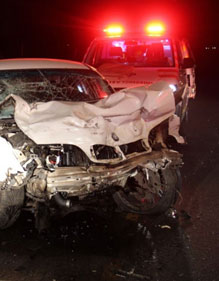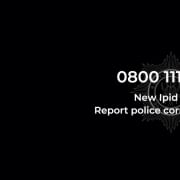|
Getting your Trinity Audio player ready...
|
 Road safety organisation Arrive Alive, in a recently published online report, discussed crimes that affect road users, as well as the quality of South Africa’s roads. These crimes include corruption.
Road safety organisation Arrive Alive, in a recently published online report, discussed crimes that affect road users, as well as the quality of South Africa’s roads. These crimes include corruption.
Arrive Alive reported: “We have to admit that we face serious challenges to safety daily at our homes, places of work and on the roads. It is not only the irresponsible road user giving a lift to the shady hitchhiker who is at risk, but each and every responsible driver, passenger, biker or cyclist!”
Besides crimes such as cable theft, which can result in reduced visibility and traffic lights out of order, and animals gaining access to roads through theft of fence posts, corruption also places road users in great danger.
The following extract from the report deals with corruption:
One of the major concerns for government and transport officials is the need to reduce fraud and corruption in the traffic environment. Corruption or bribery is described in legal terms as the practice of tendering or accepting a private advantage for the performance of a duty.
On a grand scale, money intended for maintenance of roads or service provision and the upgrading or provision of facilities is diverted for private gain. On an immediate level, unqualified drivers and non-roadworthy vehicles are granted licences and certificates.
The effect of corruption is not only a loss of state revenue. When corrupt officials allow motorists who speed, or who are driving vehicles that are not roadworthy, to proceed with their journey, the consequences for other road users are potentially disastrous
Corruption manifests itself in the following activities:
Fraud and licensing
By accepting a bribe and offering a non-competent driver a driving licence we present a threat to anyone sharing the road with that driver. During the past year several driving licence testing stations have been closed down on account of corrupt activities.
Fraud and roadworthiness
Drivers and commuters are at risk with every non-roadworthy vehicle certified to go on the roads. This includes not only testing of the vehicle mechanisms but also testing for overloading.
Fraud, bribery and traffic fines
The most common type of corruption encountered by South Africans daily are when a traffic official is bribed to either reduce or nullify the fine for a traffic offence committed. By allowing this to continue our roads become a free-for-all where road users recklessly and willingly disobey the rules of the road with the assumption that they can get away with any penalty for their misbehaviour!
Fraud and corruption in legal processes following the road offence
We too often find that offenders cannot be effectively dealt with as the cases are mysteriously bungled – blood samples, dockets and other evidence go astray or get lost, pointing towards further corrupt activities. We also find incidents of doctors and lawyers defrauding the Road Accident Fund. This has an impact on our ability to provide post-crash relief and assistance to road crash victims.
Don't keep quiet – help is available
Arrive Alive is encouraging citizens to help reduce crime on the roads by speaking out against it. This can be done by contacting:
SAPS emergency number: 10111
Crime Stop tip-off: 08600 10111
Crime Line online reporting or SMS 32211
Corruption Watch: 0800 023 456
National Traffic Anti-Corruption Unit: 0861 400 800








